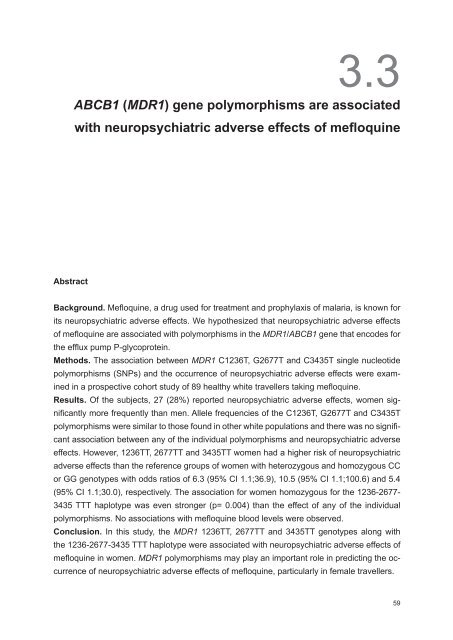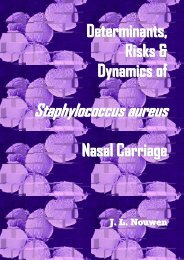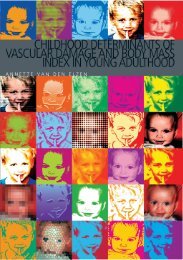Genetic susceptibility to adverse drug effects - Epidemiology ...
Genetic susceptibility to adverse drug effects - Epidemiology ...
Genetic susceptibility to adverse drug effects - Epidemiology ...
You also want an ePaper? Increase the reach of your titles
YUMPU automatically turns print PDFs into web optimized ePapers that Google loves.
3.3<br />
ABCB1 (MDR1) gene polymorphisms are associated<br />
with neuropsychiatric <strong>adverse</strong> <strong>effects</strong> of mefloquine<br />
Abstract<br />
Background. Mefloquine, a <strong>drug</strong> used for treatment and prophylaxis of malaria, is known for<br />
its neuropsychiatric <strong>adverse</strong> <strong>effects</strong>. We hypothesized that neuropsychiatric <strong>adverse</strong> <strong>effects</strong><br />
of mefloquine are associated with polymorphisms in the MDR1/ABCB1 gene that encodes for<br />
the efflux pump P-glycoprotein.<br />
Methods. The association between MDR1 C1236T, G2677T and C3435T single nucleotide<br />
polymorphisms (SNPs) and the occurrence of neuropsychiatric <strong>adverse</strong> <strong>effects</strong> were examined<br />
in a prospective cohort study of 89 healthy white travellers taking mefloquine.<br />
Results. Of the subjects, 27 (28%) reported neuropsychiatric <strong>adverse</strong> <strong>effects</strong>, women significantly<br />
more frequently than men. Allele frequencies of the C1236T, G2677T and C3435T<br />
polymorphisms were similar <strong>to</strong> those found in other white populations and there was no significant<br />
association between any of the individual polymorphisms and neuropsychiatric <strong>adverse</strong><br />
<strong>effects</strong>. However, 1236TT, 2677TT and 3435TT women had a higher risk of neuropsychiatric<br />
<strong>adverse</strong> <strong>effects</strong> than the reference groups of women with heterozygous and homozygous CC<br />
or GG genotypes with odds ratios of 6.3 (95% CI 1.1;36.9), 10.5 (95% CI 1.1;100.6) and 5.4<br />
(95% CI 1.1;30.0), respectively. The association for women homozygous for the 1236-2677-<br />
3435 TTT haplotype was even stronger (p= 0.004) than the effect of any of the individual<br />
polymorphisms. No associations with mefloquine blood levels were observed.<br />
Conclusion. In this study, the MDR1 1236TT, 2677TT and 3435TT genotypes along with<br />
the 1236-2677-3435 TTT haplotype were associated with neuropsychiatric <strong>adverse</strong> <strong>effects</strong> of<br />
mefloquine in women. MDR1 polymorphisms may play an important role in predicting the occurrence<br />
of neuropsychiatric <strong>adverse</strong> <strong>effects</strong> of mefloquine, particularly in female travellers.<br />
59









